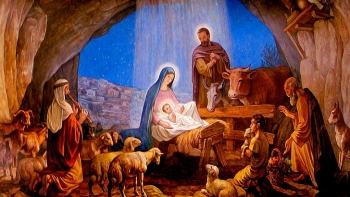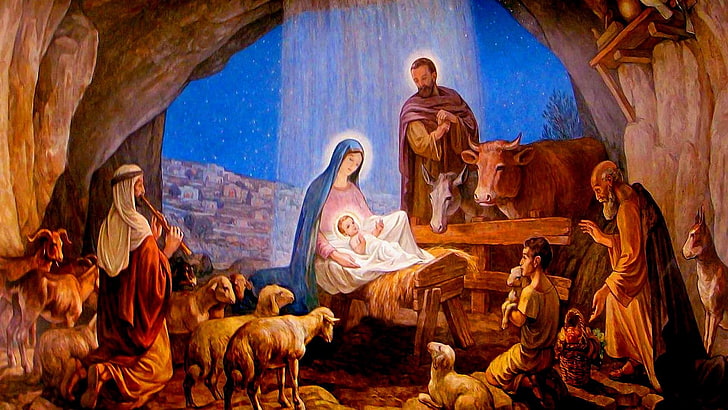
.png) Julian S Das
Julian S Das

The birth of Jesus in a manger in Bethlehem may not mean much to the majority of this nation, but surely it means a lot to those who are convinced that peace and joy are gifts lavished on us who did not merit this magnanimous act of God. It is one thing to refuse to accept grace, freely given to us, but it is a different matter when such grace is abused and tarnished, and that is exactly what is making the year-end festive mood gloomy and melancholic.
But it matters if a cross-section of the society is forced to forego the festive mood, because those who have power over them might have thought it is better that they grope in darkness and do not see the light of day. There is immense sadistic joy to witness those on the other side of the fence starve and die, feel the pain in their bones and are subjected to slow death.
Cosmopolitan Christmas
We come across missionary school children of all religions preparing the adorable crib in their houses. Most of them might not believe in what Christians profess, practice and promote; but they know that the crib is one little way how they join the universal community in celebrating the unique event in human history, where God entered the human world to change things which were considered ‘unchangeable’.
How we wish the adults not only allow their little ones to do what pleases them or permit them grudgingly, but join their little fancies and enjoy what the air around is full of. If that would happen, then there would be too little violence and persecution against Christians in the country, and there would be greater regard for what the Christian missionaries have contributed to nation-building (perhaps much more than all the Vishwa Hindu Parishad, or the Bajrang Dal, or their parental organization, Rashtriya Swayamsevak Sangh, all put together). If only these fanatics leave behind the religious part aside for a while and look at issues from a different vantage point, then they would have too little to hate the Christians for.
Good Governance or Good Riddance?
It might sound crazy, but there have been people around in our country, who thought one of the best ways to smother the spirit of Christmas was to create an alibi, which will throw mud on those who have lined up a series of celebrations and merry-making with their family and friends. Thank God, there is a good enough reason, if we go by those who govern us, to dump the Christmas and raise the flags of ‘Good Governance Day’ on the very day.
The former Prime Minister, Atal Behari Vajpayee, whose birth day coincides with the babe in the manger, would have never allowed his name dragged in to shroud Christmas joy; the co-founder of the Bharatiya Janata Party (BJP) surely was not such a hard-hearted man, as his successors turned out to be. The ‘Susashan Divas’, as it is dubbed in Hindi, is a tribute to the man, who had contributed to the building of the name through his good governance. The idea behind instituting an annual day was to “honour Prime Minister Vajpayee by fostering awareness among the Indian people of accountability in government”.
This is a tribute made by the incumbent PM Narendra Modi on December 23, 2014, while honouring the then 90-year-old Vajpayee and Madan Mohan Malaviya posthumously with the highest Indian civilian award, Bharat Ratna, bestowed on them by the then President Pranab Mukherjee.
What is ironical about the institution of the Good Governance Day by Modi is that he is the one who indulged in anything other than being accountable, with his historic move with “PM Cares” fund which is not audited, which is not accountable to those who doled out their mite, hoping it would reach the most deserving of the nation.
If Modi meant to follow his mentor in being accountable, then he would not have thought of a shadow account, or at least would have brought it under the government exchequer or private Registered Society or Trust, whose accounts should be audited and made public.
Sabotaging Serenity
At the first sight, the great work of instituting a day to honour a former Prime Minister may be praise worthy, and making his birth day as a model day of good governance may be seen as noble. But behind the façade of these noble ideologies is the hidden face of the Hindutvawadis who are ready to sabotage the peace and joy of Christmas.
Though Christmas has been a gazetted holiday, after the institution of the Good Governance Day, it is made a working day for the government, which implies that Christian government employees would be duty-bound to attend office, on the second biggest feast of their religion.
We had seen such things happening when the Election Commission of India deliberately held Panchayat or Municipality or Assembly or Lok Sabha elections on Good Friday, and compelling Christian teachers and poll officers to be on duty, even on one of the most important days of their religiosity. Obviously, the right-wing leaders cannot accept Christians being joyful. One simple question that we can pose to them is this: Would the leaders do the same on a significant Hindu festival?
Governance at its worst
Those who claim that the present government at the Centre is an exemplary one, then we may have to take a good look at what governance is. Governance, if it were to be a model, has to be one where all the decisions are not only benefiting those at the lowest rungs of the societal structure, but also those where such people are part of the decision-making process.
We may take a close look at some of the most debated, discussed and hugely opposed Bills passed by the Parliament and have become law like the Citizenship Amendment Act and the three ominous Farm laws (which have since been repealed). The same is the case with demonetization and the Goods and Services Tax. Some of the most sensitive laws of far-reaching consequences have been made at the eleventh hour, giving no adequate time to debate.
If we have to summarise the nature of governance at the Centre, it is far from being 'good', and celebrating once a year 'Day of Good Governance' is not going to change the scenario even the least. For if the Prime Minister and his ministers think that good governance is the need of the hour, then they need to take concrete steps to show the citizens that they are at least moving towards it.
Saviour Shows the Way
It may be too hard for the hardliners to imagine that a child born in a manger in Bethlehem a little over two thousand years ago could still inspire billions of people across the globe to know what good governance is all about. Let us look at just four characteristics of good governance that the top Indian leaders can learn from the divine child of Bethlehem (if only they have the humility to learn).
First, the Saviour comes down from heaven to the earth, leaving behind the heavenly bliss and thus taking human form; if our leaders can come down from their ivory towers and reach out to those living in ignorance, poverty, hunger, unemployment, lack of habitation, then there would be rays of good governance emerging in our land.
Second, God chose the less known town of Bethlehem to let his Son pitch his tent among humanity; he did not choose the well-fortified city of Jerusalem, but the almost unknown town, and he would live a “hidden” life for the major part of his life. It is time that our leaders leave the comforts of the city and urban living and go to the lesser-known villages and towns to see reality. For this, our leaders will have to take dusty roads.
Third, the new-born child had as his first acquaintances the simple village people and shepherds of the neighbourhood. These are the people who have been on the margins of the society, who have been shunned by the “genteel” society. Good governance can only begin when those on the periphery are first approached and any development is seen from their perspective.
Fourth, the child in the manger also reminds the floating population; we may call them refugees, or migrants or casual labourers. If the leaders care for the people, then they need to take into consideration who are always on the move, either because of survival or because of job opportunities, and provide support systems which would assure that they are well-protected and their basic needs taken care of. That is where good governance can flourish.
Ultimately, it may be impossible to smother the Christmas fire because it is no more in the custody of the Christians but has become the universal symbol of a new beginning where people become first.